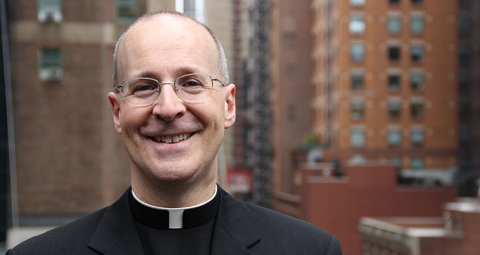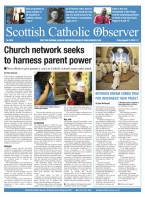BY Ian Dunn | July 28 | ![]() 0 COMMENTS
0 COMMENTS ![]() print
print

Building bridges with LGBT Catholics
IAN DUNN speaks to Fr James Martin about his controversial book attracting both praise and criticism
Fr James Martin is one of the most famous priests in America. His TV appearances and books have won him a devoted following around the world and led to him being made a communications consultant to the Vatican.
He is now using his formidable skills as he sets about ‘Building a Bridge,’ as his new book has it, to gay Catholics. The book has received advanced praise from high-ranking cardinals and bishops, both in the United States and in Rome.
Although it has been controversial in some quarters, the book has been praised by senior members of Church including Cardinal Kevin Farrell, prefect of the Vatican’s Dicastery for Laity, Family and Life, who said it is a ‘welcome and much-needed book that will help bishops, priests, pastoral associates, and all Church leaders, more compassionately minister to the LGBT community.”
Fr Martin says the origins of the book were the fact he’s been involved in informal ministry to gay Catholics for many years.
“I’m not a chaplain to any group but for a number of reasons people feel comfortable coming up to me after talks or during retreats and one-on-one and sharing their stories with me,” he said.
Yet the actual spur was a tragic act of violence.
“After the shooting in Orlando [where Omar Mateen, a 29-year-old security guard, killed 49 people and wounded 58 others in an attack on a gay nightclub] I felt I needed to say something a little more forceful,” he said. “So when new age ministry [a group in the US that supports LGBT Catholics] asked me accept their bridge building award, I took it as an opportunity to write a longer talk, and that became this book. Which is not just about building a bridge between the LGBT people and the Church—it’s also a compendium of spiritual resources, Bible passages and refection questions to help LGBT Catholics and their families.”
He says in writing the book he wants to ‘challenge Church officials, such as bishops, archbishops, cardinals, priests, and lay-workers’ to listen to the experience of LGBT Catholics.
“You know, you can scarcely say that you’re trying to be respectful, compassionate, if you’re not even listening to people,” he suggests.
“If we can’t even listen to one another, we’re in trouble. Often we have listening sessions and seminars and Masses for other groups in the Church who feel marginalised. So for example women, refugees, young people—they feel less attended to in many other ways.”
That proposal, Fr Martin said, often attracts critics from the right, who argue that even listening to LGBT Catholics is promoting sin.
“My analogy on this is that we have regularly reached out to Catholic business people,” he said. “That does not mean that we agree with every single things that corporate America teaches, or that every single Catholic businessman or woman does.”
He suggests that listening will help open up a space for LGBT Catholics in the Church, as the subtitle of his book is ‘treating one another with respect, compassion and sensitivity.’
“One of the critiques that I’m expecting of the book is that the LGBT community will think I haven’t gone far enough, but the institutional Church will think I’ve gone too far,” he said. “That’s really meeting in the middle of the bridge. I think the LGBT community has really been treated poorly.
“People come up to me and tell me exactly what they’ve heard from priests, things that are incredibly exclusionary and just mean, to use an underused word. So I think the Church needs to do a bit of examination of conscience. It’s a two-way bridge.”
Fr Martin says the book has had a very positive response from LGBT Catholics as ‘most of them are very grateful that something like that is out there.’
“It’s really something that’s not talked about, so for them the idea that a priest would be willing to address that issue more or less head on is something that’s made them very happy,” he said. “But I think one of the most surprising aspects of this has been the number of parents and grandparents who have came up to me and expressed their gratitude.
“The other night I was giving a talk at Yale University and an elderly woman, probably in her 80s, came up and leaned over and said ‘my granddaughter is transgender. Thank you so much for writing this.’
“So that’s the population that I think the Church may not really know is out there. Not necessarily LGBT Catholics, but their parents and grandparents, aunts and uncles and friends. That’s been really surprising—I have to say I did not expect that at all.”
He said that it’s also important to accept the fact that it’s natural for LGBT Catholics to sometimes feel anger and fury at what they see as a ‘double standard or hypocrisy.’
“I have seen many people who feel that when they hear of stories of clergy engaging in those kinds of activities that they themselves have condemned, there’s this great sense of betrayal and hurt, and that’s natural,” he said.
“At the same time, the Christian message is to have compassion and forgive, as hard as that is.
“That’s a very hard thing for people to hear, but at some point that does have to be the message: compassion and forgiveness.”
That should be at the core of the Church’s message especially in education.
“There are some things that the Catholic Church should teach, which are being against bullying, targeting people and labelling people, and standing up for the marginalised,” he said.
“We have endless experience in education, so to bring our Christian compassion into it is the easiest thing in the world. I always say to people, who did Jesus reach out to first?
“People on the margins, and that’s what we need to do. If we’re so afraid of speaking about this, love goes out the window.”
Taking on this issue and having such a high profile means Fr Martin has become a lightning rod for furious online debate between liberal and conservative Catholics.
“I don’t take it too seriously,” he said. “Because I get home to my own community and they really don’t care. More seriously, my brothers keep me grounded.
“I have a lot of friends who aren’t really into social media or Church news or politics. So when I get agitated about something I’ll call one of them and they’ll say, ‘I have no idea what you’re talking about.’
Still he admits that the online grief he receives ‘used to bother me a lot more.’
“ A few years ago I was on retreat and I was praying over the rejection at Nazareth where Jesus proclaims what he needs to proclaim and gets attacked,” he said. “In my prayer I said, how are you able to do that, and He said ‘must everyone like you all the time?’ and that was very freeing.
“Second, I realised that engaging some of these people of social media is fruitless and it will evolve into endless bickering. Third, I realised that a small fraction of people of social media are crazy. And so those three things keep it in perspective.”
Still, he says he feels the world has ‘become more divisive, more polarised and meaner.’
“For a number of reasons,” he said, “I think people think they now have the right to be mean and I think that social media has exacerbated it. Giving people echo chambers in which they only listen to people they’re comfortable with—the political discourse has coarsened.”
But still he is utterly convinced that the Church has a vital role to play in the world.
“Just preach the Gospel,” he said. “The Holy Spirit is going to attract people to churches if we preach about Jesus. For people who fear the Church has left them I say find a welcoming place, a welcoming ministry, and find your way back in your own way.
“Jesus is just as magnetic as he was when the crowd were trying to touch his garment. We’re not in a postChristian world, as some say; we’re in a pre-Christian one.”










